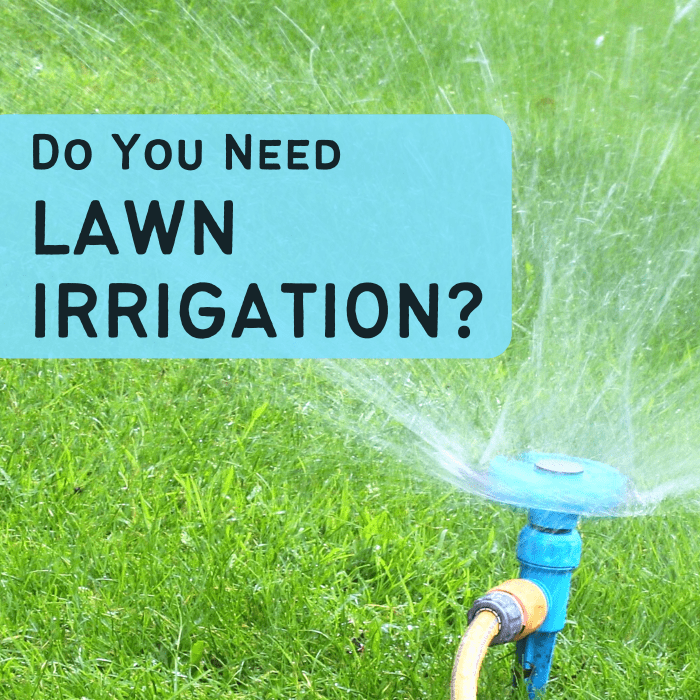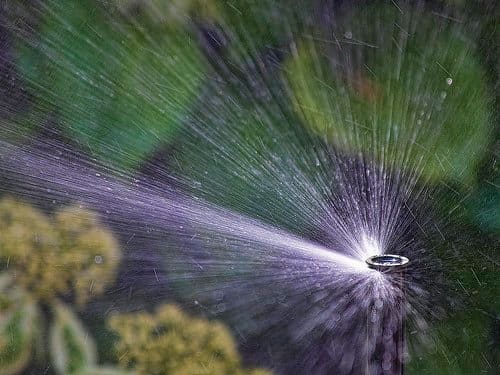How to Tell if Your Lawn Needs Lime
Joseph has had a lawn and irrigation business in Florida for almost a decade and enjoys sharing his landscaping tips.

Learn about the common types of lawn irrigation and whether installing an irrigation system could benefit your yard.
Image by bluebudgie from Pixabay
Does My Yard Need a Sprinkler System?
Lawn irrigation has become a popular addition to new homes. The luxury of not having to worry about the health of your lawn and flower beds is an attractive benefit that many home buyers look for when deciding on a new home. Why is that? We will take a look at the types of irrigation available and the specific benefits of having irrigation installed on your property.

Pop-up Sprayer
Popular Types of Lawn Irrigation
Depending on the size of your lawn and the climate of the area in which your house is built, there are many different types of irrigation systems that can be used to keep your lawn and flower beds healthy and watered. Types of irrigation systems and components include:
- Pop-up Sprayers: These are sprinklers that are underground or otherwise hidden until they are used. Most of these systems are piped underground and can cover up to a 15-foot radius or more.
- Pop-up Rotors: Similar to pop-up sprayers, these sprinklers put out a solid stream that rotates to cover a larger area rather than constantly spraying the whole area. These take more water pressure and gallons per minute, but they can cover a much larger area and can better handle wind without wasting water.
- Impact Sprinklers: Similar to pop-up rotors, impact sprinklers rotate around to cover a larger area; however, they utilize an impact bar to spray both far away and near the sprinkler and can spray a little farther than a rotor.
- Drip Irrigation: Primarily used for flower beds and gardens, drip irrigation does exactly what it says: It drips. So, there is no reach, and a terminal has to be near every plant that is being watered. This type of irrigation does not necessarily need underground pipe, so it can be done more cheaply; however, it is prone to clogging due to calcification and is less likely to last as long.
- Mist Irrigation: Similar to drip irrigation, mist irrigation can be fairly cheap and low pressure. They are set up the same, for the most part, but this irrigation system uses different tips that put out a fine mist rather than dripping down to the roots. Again, these are good for flower beds or gardens, but they do not reach far enough to water a lawn.
- Bubbler or Soaker Irrigation: These are usually done with flex hose or soaker hose. Both can be hooked up to a water hose faucet and run under ground covering or bedding to water the roots of plants, bushes, or trees. Again, these will not work for lawns.
Benefits of Pop-Up Irrigation
In most areas of the United States, pop-up irrigation is becoming more popular, especially in new construction. Homeowners and buyers are wanting installation of pop-up sprinklers of various types for the irrigation of lawn grasses, hedges, and flower beds. Benefits of this type of irrigation over others are:
- Hidden Sprinkler Heads: Pop-up irrigation uses heads that come up out of the ground or shrubs and then go back. This means no water hose laying out in the yard and nothing to trip over. All that is seen is your beautiful lawn and flowers.
- Added Resale Value: Installation of these systems can cost a decent amount; however, they can add several thousand dollars to the value of your home, along with giving you an added benefit that can make your home much more appealing to possible buyers.
- Less Upkeep: Pop-up sprinkler systems are less likely to have problems from calcification or breaks than the other types of irrigation, such as misters and drip irrigation.
- Fully Automatic: These systems come with automatic timers that allow your system to run a set amount of time in the early hours of the morning. That means that your system is running without requiring anything from you, and it is running at a time that is most efficient.
Why Do You Need a Timer?
Irrigation timers have been used in residential irrigation for decades; however, they have come a long way. When they first came into use, timers were mostly mechanical, not electronic, and simply controlled when the irrigation would start and how long each zone would run. Today, irrigation controllers can offer several different programs, different start times, and more. Newer timers have attachments that can stop irrigation if there has been rain, but they can also monitor heat, humidity, and more to make sure the correct amount of water is delivered to the yard.
The primary reason to have a timer is consistency. Grass and plants need a consistent amount of water to grow in a healthy manner. They also prefer water when the sun is not out; therefore, having a timer that can run at 3 a.m. so that you don't have to get up to turn the sprinklers on is an excellent idea. Also, running the irrigation at that time of the day provides the greatest efficiency, saving you money and conserving a valuable resource.
How to Get Your Money's Worth
Understanding the worth of irrigation and knowing what irrigation costs in your area are two items that are paramount to getting the most out of your system, money-wise. There are three underlying reasons to maximize the effect of having an irrigation system:
- Wanting to get the most out of your yard, beautifying it, and getting enjoyment from that.
- Gaining the ease of use and environmental efficiency that a sprinkler system brings.
- Investing in your property for future monetary benefit.
Read More From Dengarden
Yard Beauty
If you are simply interested in installing a system to make you yard beautiful, your focus when designing the system will be on which items in the system will make the most benefit to your yard, plants, flowers, etc. You may want a fertilizer injector that can spray fertilizer-infused water onto your yard and beds. You may want pop-up heads that raise 8"–12" so they are more easily hidden in plants and shrubs.
Environmental Impact
For people who are focused on the environmental impact, water-saver heads will be more appealing. A timer that has options to monitor humidity and rainfall will be a plus. You can even get a timer that will link to your cell phone so that if you know rain is coming, you can limit watering prior to the weather's arrival.
Financial Impact
Finally, those who are looking forward to the financial impact of having an irrigation system will want to remember that ease of use and quality of work will be important for potential buyers. An easy-to-use timer and sprayers and pop-ups that look like good handiwork are a must. Buyers will not want to see hoses and spray lines all over or unpainted PVC pipe above ground.
Make sure that whomever installs your system does quality work. You want to be sure you get a fair deal on your installation, but if you simply go for the cheapest contractor, you may end up with areas that need to be reworked prior to the sale of your home.

Rotor Sprinkler
Do Your Research and Enjoy Your Irrigation
To wrap up, although a sprinkler system can be an excellent investment and a time-saver, understand that there are plenty of decisions to make prior to installation.
- Find an irrigation contractor that will work with you on designing a system that fits your yard and your budget.
- Beware of contractors that simply make all the decisions for you or try to force you to use a specific type of irrigation without giving you examples of why you should.
- Understand your local laws and building codes. If your municipality requires a Backflow Preventer, it probably requires a permit to have one put in place. It also may require that you have that device tested by a licensed contractor on a yearly basis.
This article is accurate and true to the best of the author's knowledge. Content is for informational or entertainment purposes only and does not substitute for personal counsel or professional advice in business, financial, legal, or technical matters.
Louise89 on May 22, 2019:
Great information! Thanks!
Vivek Subramanium on September 20, 2017:
Hi
Awesome article written by author. article is useful for lawn irrigation I really agree with author. Above mentioned all irrigation types are good and useful in loan irrigation. I suggest you another Sprinkle irrigation system.
http://netafimindia.com/products/sprinkler-irrigat...
How to Tell if Your Lawn Needs Lime
Source: https://dengarden.com/gardening/do-i-need-lawn-irrigation